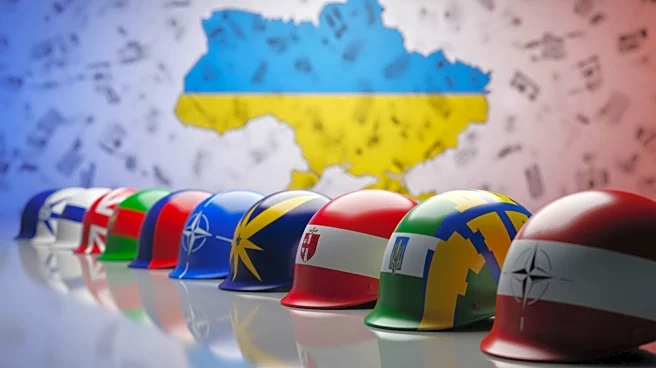What's Happening?
NATO defense ministers are set to meet to discuss increasing military support for Ukraine, as recent data shows a significant drop in Western aid. The Kiel Institute reported a 43% decrease in military aid to Ukraine during
July and August compared to earlier months. This decline comes despite European allies purchasing American weapons for Ukraine under the Prioritized Ukraine Requirements List. Concerns are mounting over Russian airspace violations and drone incidents, prompting NATO to establish air defense operations along its eastern flank. The alliance is also considering lifting restrictions on the use of aircraft and equipment to better defend against threats from Russia.
Why It's Important?
The reduction in military aid to Ukraine highlights challenges in sustaining international support amid economic pressures faced by NATO member countries. The situation underscores the strategic importance of maintaining robust defense capabilities along NATO's eastern border to deter Russian aggression. The potential lifting of restrictions on military equipment use could enhance NATO's defensive posture, ensuring a unified response to airspace threats. The ongoing conflict in Ukraine remains a focal point for international security, with implications for NATO's strategic priorities and defense spending.
What's Next?
NATO's defense ministers will debate strategies to increase military support for Ukraine and address airspace concerns. The alliance's top officers are advocating for the removal of national caveats that limit the effectiveness of air defense operations. The meeting will also explore ways to enhance NATO's air shield and establish common rules of engagement. The outcome of these discussions could influence future military aid packages and the strategic alignment of NATO member countries in response to Russian actions.
Beyond the Headlines
The situation raises questions about the sustainability of international military aid and the balance between supporting Ukraine and addressing domestic economic challenges. The strategic decisions made by NATO could impact the alliance's cohesion and its ability to respond to future security threats. The ethical implications of military aid and the use of advanced weaponry in conflict zones also warrant consideration.










